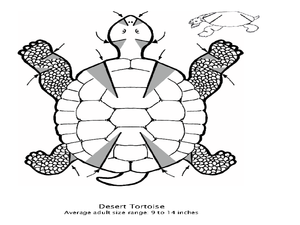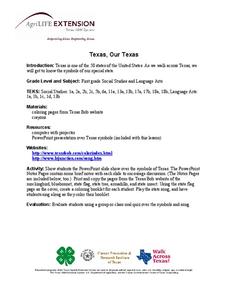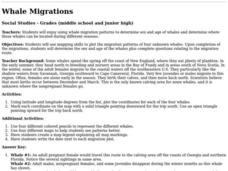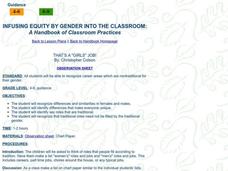Learning Games Lab
Bacteria Sampling
Scholars explore the procedure for bacteria sampling in a virtual lab by first walking through a detailed step-by-step procedure of preparing the samples of raw milk and pasteurized milk, growing the bacteria, and comparing results....
Learning Games Lab
How to Use Oil Immersion Microscope
Teach the class how to use a microscope to identify bacteria in food. Scholars explore the different parts of the microscope and learn how to determine total magnification. They walk step-by-step through the procedure of preparing slides...
Learning Games Lab
Testing and Adjusting pH
Pupils learn how to control food spoilage by adjusting the food's pH. They see that one of the most dangerous bacteria can grow in food if people don't handle and store food properly. Using knowledge of the bacteria's preferred pH,...
Science 4 Inquiry
The Real Story of Where Babies Come From
Pupils learn about both male and female anatomy before understanding how they work together to make a baby. Scholars discover new vocabulary, create a presentation on fertilization, and discuss related topics.
Learning Games Lab
The Magic of Reading Graphs
Making conclusions from graphs doesn't need to seem like magic. Learners explore an interactive lesson on reading graphs to strengthen their skills. The content discusses how to read the axes of a graph and draw conclusions based on the...
Curated OER
AIDS and Adolescence
Ninth graders examine the relationship between AIDS and teenagers. In groups, they discuss the various issues educators face in introducing the topic to teenagers in school. As a class, they brainstorm a list of the misconceptions they...
Curated OER
Abstinence
Students identify positive reasons why people choose to practice abstinence and complete communication that is successful in this practice. In this abstinence lesson plan, students view videos and fill out worksheets provided.
Curated OER
From Basketball Court to Supreme Court
Students discuss scenarios about unfairness and retaliation in school sports. They read about a recent Supreme Court ruling about Title IX, and research, conduct polls and write articles about public opinions on gender issues in sports.
Curated OER
Sexually Transmitted Diseases: Overview
Students observe human heath by completing a worksheet in class. In this STD lesson plan, students identify the different types of diseases which are spread through sexual intercourse and what symptoms will become noticeable. Students...
Curated OER
Marital Adjustments
Students discuss the importance of marital adjustments during marriage. They identify common marital adjustments and how to resolve them. (in-laws, sex, dual income, etc.) They determine that marriage adjustments are common and...
Curated OER
Diamond Terrapin Fun Facts
In this animal learning exercise, students complete 6 pages of activities and exercises pertaining to the diamondback terrapin. Students read about the life cycle, study habitat maps and color and cut out a three dimensional turtle.
Curated OER
Texas, Our Texas
Students explore U.S. geography by completing a coloring activity in class. In this Texas history instructional activity, students utilize the web to locate Texas on a map of the U.S. Students view a PowerPoint presentation which...
Curated OER
Health Outreach -- Creating Research -- Based on Pamphlets on STDs
Students view a video clip about people affected by STDs. They research causes, symptoms and cures of a sexually transmitted disease of their choice. They create a pamphlet to share information.
Curated OER
Birds, Bees and STDs
Students develop knowledge on STD's, their causes, treatment and prevention. In this investigative lesson students mingle with each-other to find the STD, then get into groups and research STD's on the CDC site.
Curated OER
Whale Migrations
Students use whale migration patterns to determine sex and age of whales and determine where these whales can be located during different seasons. They use mapping skills to plot the migration patterns of four unknown whales.
Curated OER
STDs
Students list the common types of STDs, HIV/AIDS and their symptoms. They complete worksheets concerning adult roles and responsibilities and determine ways to avoid disease. They use study guides and web sites to examine pertinet...
Curated OER
The Vaccination Question
Pupils share opinions about common vaccines, then consider facts and opinions about the HPV vaccine and hold a fishbowl and discussion. They survey members of the community to determine their perspectives on the issue.
Curated OER
STI CAse Studies
Students evaluate case studies in which a person is exposed to a sexually transmitted infection. They read, discuss and answer questions based on four different case studies which involve herpes, HPV, chlamydia, and gonorrhea.
Curated OER
Risky Business
High schoolers view a video on AIDS, HIV and the ways in which HIV is spread. They discuss ways to avoid contracting HIV and participate in a simulation that shows the growth of a communicable disease.
Curated OER
THAT'S A "GIRLS" JOB!
Young scholars identify the differences in males and females and examine how sex roles are traditional.
Curated OER
I'm the Teacher
First graders simulate being the teacher and giving P.E. commands to the class. They each write a sentence and take turns reading their sentence to the class, and after each sentence has been read the class performs the activity...
Curated OER
Whole Child: Parenting Skills
Students and parents participate in a variety of activities intended to develop both the growth of the child and the parenting skills of the adult. They role-play daily activities, manipulate dough, discuss the rights and...
Curated OER
Crab Lab
Students participate in an activity in which they observe the behavior of a crab. In groups, they label and identify the function of each main part while observing and record their behavior. They make educated guesses on why they...
Curated OER
Communication, Day 3: Asking What You Want
Mild to moderately disabled secondary students practice asking for what they want. They discuss a scenario, list things they want, then practice asking for those things. Our special needs students need to know how to communicate...

























